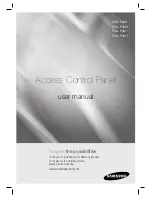
1-6
Installation/Wiring
PowerFlex Diode Bus Supply User Manual
Publication 20T-UM001D-EN-P
Power Wiring
To maintain balanced impedance, and thus balance current in the Diode Bus
Supply, it is recommended to keep all wired connections identical in size
and length. This includes the AC line connection to three-phase AC line
reactors and from the three-phase AC line reactors to the Diode Bus Supply.
Cable Types Acceptable for 200…600 Volt Installations
A variety of cable types are acceptable for Diode Bus Supply installations.
For many installations, unshielded cable is adequate, provided it can be
separated from sensitive circuits. As an approximate guide, allow a spacing
of 0.3 meters (1 foot) for every 10 meters (33 feet) of length. In all cases,
long parallel runs must be avoided. Do not use cable with an insulation
thickness less than or equal to 15 mils (0.4 mm/0.015 in.). UL installations
in 50 °C (122 °F) ambient must use 600V, 90 °C (194 °F) wire. UL
installations in 40 °C (104 °F) ambient should use 600V, 75 °C (168 °F)
wire.
THHN, THWN or similar wire is acceptable for Diode Bus Supply
installation in dry environments provided adequate free air space and/or
conduit fill rate limits are provided. Do not use THHN or similarly coated
wire in wet areas.
EMC Compliance
for details.
Cable Trays and Conduit
If cable trays or large conduits are to be used, refer to guidelines in the
Wiring and Grounding Guidelines for Pulse Width Modulated (PWM) AC
Drives, publication
.
!
ATTENTION: National Codes and standards (NEC, VDE, BSI,
etc.) and local codes outline provisions for safely installing
electrical equipment. Installation must comply with specifications
regarding wire types, conductor sizes, and disconnect devices.
Failure to do so may result in personal injury and/or equipment
damage.
!
ATTENTION: To avoid a possible shock hazard caused by
induced voltages, unused wires in the conduit must be grounded at
both ends. For the same reason, if a drive sharing a conduit is being
serviced or installed, all drives using this conduit should be
disabled. This will help minimize the possible shock hazard from
“cross coupled” motor leads.
















































